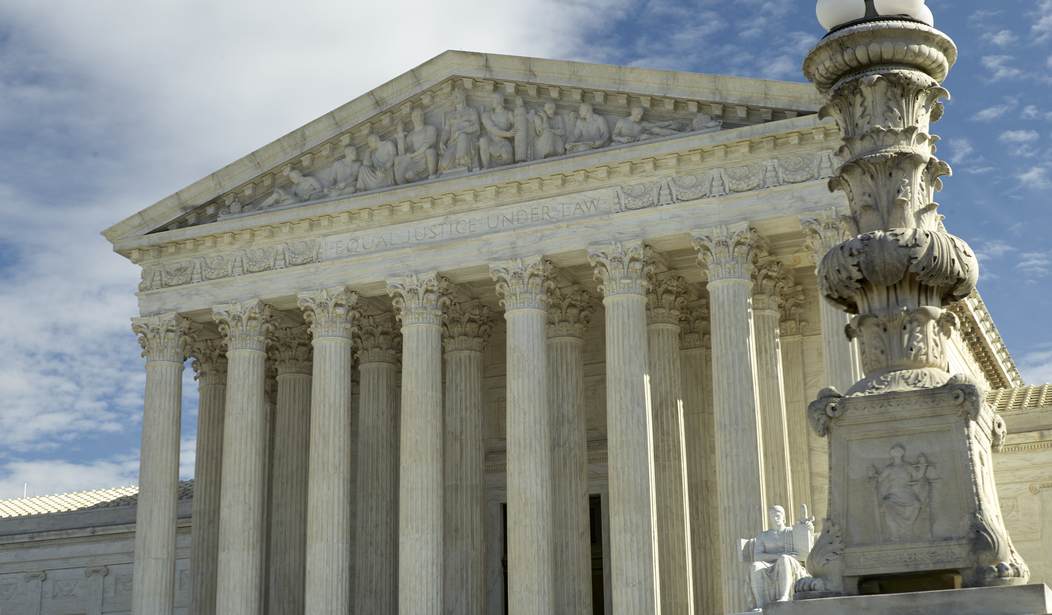For decades, going back at least as far as the 1973 Roe v. Wade decision that concocted a constitutional right to abortion, conservatives have placed a great emphasis on winning back culture war ground through judicial nominations. As a consequence of that, Republicans have consistently told political pollsters that the Supreme Court is their top voting issue at a far higher clip than Democrats have. The Court, for instance, was certainly the decisive issue in the hotly contested 2016 presidential election.
As the current Court term winds down -- one featuring a putative 6-3 "conservative" majority, including three new nominees of former President Donald Trump -- it is worth taking stock of where the long-term project to make cultural inroads by way of the judiciary stands. We can do so by considering two of this term's highest-profile cases, the politically charged Obamacare case of California v. Texas and the culturally charged religious liberty case of Fulton v. City of Philadelphia.
In California --"the third installment in our epic Affordable Care Act trilogy," Justice Samuel Alito quipped in dissent -- a 7-2 Court majority again left former President Barack Obama's signature domestic policy untouched. The Court declined to reach the substantive constitutional issue, and dismissed the lawsuit brought by Texas and 17 other states on the threshold issue of "standing" -- lawyer-speak for the need for a plaintiff to show a concrete injury that is traceable to the defendant's conduct and able to remedied by a court.
The technical standing dispute in California is legally debatable: Trump nominee Justice Neil Gorsuch joined Alito's lengthy dissent, but Justice Clarence Thomas, who is no less a conservative, joined the majority. Trump's other two nominees, Justices Brett Kavanaugh and Amy Coney Barrett, also joined the Justice Stephen Breyer-penned majority opinion, despite ubiquitous leftist protestations during their respective nominations -- especially Barrett's last fall -- that a Senate vote for confirmation amounted to a vote to repeal Obamacare. So much for that. Senate Judiciary Committee Democrats' hyperbolic fear-mongering proved just as pointless as conservatives' various litigation campaigns to overturn Obamacare.
Recommended
In Fulton, a unanimous Court held that the city of Philadelphia violated the First Amendment when it refused to contract with Catholic Social Services for the provision of foster care services unless it certified that same-sex couples were permissible as prospective foster parents. Superficially, a 9-0 ruling for CSS is welcome, especially amidst the backdrop of ascendant public support for same-sex marriage and the Court's repeated emphasis on the need for "equal dignity" for same-sex couples that pervaded its landmark 2015 same-sex marriage case, Obergefell v. Hodges. It is indeed notable that no one -- not even far-left Justice Sonia Sotomayor -- deemed the "dignitary harms" to prospective homosexual foster parents to be so great as to override CSS' conscience objections.
But Fulton could, and should, have been so much more. Fulton represented the Court's best opportunity in years to overrule Employment Division, Department of Human Resources of Oregon v. Smith, a deeply controversial 1990 ruling from the late Justice Antonin Scalia that disclaimed any First Amendment violation where a neutral law of general applicability has an incidental effect of curtailing religious freedom. Smith was always legally dubious and as a pragmatic matter would countenance the constitutionality of Catholic Mass-infringing generic wine bans and kashrut-infringing generic requirements to stun an animal before slaughtering it -- as Alito described in his 77-page concurrence that frankly read more like a dissent. Chief Justice John Roberts' exceedingly narrow decision "might as well be written on the dissolving paper sold in magic shops," Alito snarked. But Kavanaugh and Barrett apparently disagreed, depriving the Court of a five-justice anti-Smith majority.
It is time for a reckoning. The conservative legal movement needs to soberly confront and grapple with its shortcomings. Some of those shortcomings are structural, such as an undue emphasis on nominating and promoting libertarian-leaning jurists who are passionate about reining in the administrative state, but reluctant to defiantly wade in on dreaded "cultural issues." And some of those shortcomings are methodological -- namely, the widespread adoption of a blinkered positivist and historicist originalist jurisprudence to the exclusion of a more substantively conservative and natural law-informed jurisprudence, such as what I call "common good originalism."
Regardless, the reality is that, as South Texas College of Law professor Josh Blackman recently wrote: "We don't have a 6-3 conservative Court. We have a 3-3-3 Court," including three centrists of varying degrees of malleability. Unless fundamental changes are made that cut to the core of the modern conservative legal movement, conservatives will remain disappointed. The Court is not, and will not be, our savior.

























Join the conversation as a VIP Member